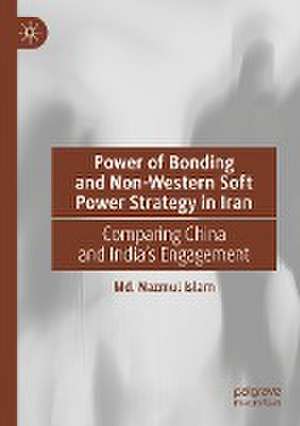Power of Bonding and Non-Western Soft Power Strategy in Iran: Comparing China and India's Engagement
Autor Md. Nazmul Islamen Limba Engleză Paperback – 10 dec 2023
| Toate formatele și edițiile | Preț | Express |
|---|---|---|
| Paperback (1) | 778.28 lei 43-57 zile | |
| Springer International Publishing – 10 dec 2023 | 778.28 lei 43-57 zile | |
| Hardback (1) | 782.60 lei 43-57 zile | |
| Springer International Publishing – 10 dec 2022 | 782.60 lei 43-57 zile |
Preț: 778.28 lei
Preț vechi: 949.13 lei
-18% Nou
Puncte Express: 1167
Preț estimativ în valută:
149.05€ • 153.57$ • 124.86£
149.05€ • 153.57$ • 124.86£
Carte tipărită la comandă
Livrare economică 24 februarie-10 martie
Preluare comenzi: 021 569.72.76
Specificații
ISBN-13: 9783031198694
ISBN-10: 3031198697
Ilustrații: XXVI, 356 p. 37 illus., 30 illus. in color.
Dimensiuni: 148 x 210 mm
Greutate: 0.5 kg
Ediția:1st ed. 2023
Editura: Springer International Publishing
Colecția Palgrave Macmillan
Locul publicării:Cham, Switzerland
ISBN-10: 3031198697
Ilustrații: XXVI, 356 p. 37 illus., 30 illus. in color.
Dimensiuni: 148 x 210 mm
Greutate: 0.5 kg
Ediția:1st ed. 2023
Editura: Springer International Publishing
Colecția Palgrave Macmillan
Locul publicării:Cham, Switzerland
Cuprins
1. Introduction.- 2. Theoretical framework and non-western soft power strategy.- 3. China’s soft power strategy.- 4. China’s soft power strategy in Iran.- 5. India’s soft power strategy.- 6. India’s soft power strategy in Iran.- 7. Comparing the China and India’s soft power strategy in the case of Iran.- 8. Conclusion.
Notă biografică
Md. Nazmul Islam is an Assistant Professor in the Department of Political Science and Public Administration and Head of Turkey, Asia, and Indo-Pacific Studies at ULİSA, Ankara Yildirim Beyazit University. He is also an Adjunct Assistant Professor in the Department of Media and Communication Studies at Ankara University, Turkey.
Textul de pe ultima copertă
This book comparatively assesses the China and India’s soft power strategy in Iran. By employing Joseph S. Nye’s “Soft Power” theory and forming the new concept of “Power of Bonding”, this book formulated China and India’s soft power narratives and applied it through the empirical analysis in Iran. Based on this theory, this book seeks explanations for the question of “How China and India respectively, strategically and comparatively use the soft power strategy in Iran?”. To reach the find-out, this book compares the understanding, resources, strategies, influences and uses of China and India’s soft power in Iran under three thematic areas, including “power of bonding through cultural attractions, and attributions”; “political and diplomatic engagement” and “economic partnerships”. By analysing China and India’s soft power strategy in Iran, this book seeks to contribute to the soft power literature through a theoretical replication based on non-Western soft power strategy, the concept and its empirical application in China and India.
Md. Nazmul Islam is Assistant Professor in the Department of Political Science and Public Administration and Head, Turkey, Asia and Indo-Pacific Studies, ULİSA, Ankara Yildirim Beyazit University. He is also an Adjunct Assistant Professor in the Department of Media and Communication Studies at the Ankara University, Turkey.
Caracteristici
Assesses the China and India’s soft power strategy in Iran Compares the understanding, resources, strategies, influences, and uses of China and India’s soft power Seeks to contribute to the soft power literature through a theoretical replication
